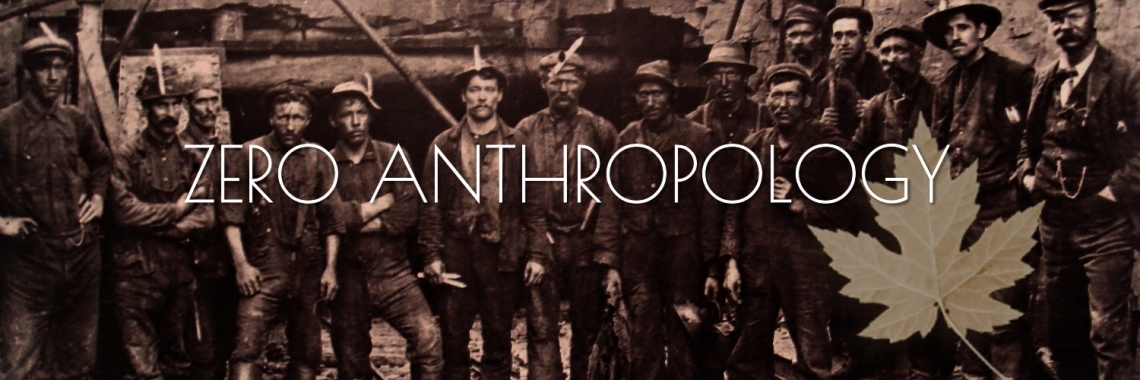
Anthropology, Empire, and Canada

Published from Montreal (Quebec), Canada

Zero Anthropology Magazine by Maximilian C.Forte is licensed under a Creative Commons Attribution-NonCommercial-ShareAlike 4.0 International License.
Based on a work at https://zeroanthropology.net.
Contact:
Maximilian C. Forte
Dept. of Sociology & Anthropology
1455 de Maisonneuve Blvd. W.
Montreal, QC, Canada
H3G 1M8
maximilian.forte@concordia.ca
Statement by Maximilian Forte:
As of early 2016, this site will have three broad aims, which stem from my three current research projects, which are likely to occupy me to the end of my professional career.
The first, and broadest of the three, has to do with the anthropology of contemporary/recent imperialism. Can there be an anthropology of imperialism, and if so, what would it look like? What is the relationship between anthropology and imperialism, both historically and currently? What challenges does imperialism pose to the constitution of the social sciences as several, specialized disciplines? How does imperialism relate to fundamental matters of “the human condition”? Within this broad stream, I am looking at the contemporary culture and political economy of imperialism, down to everyday life, and in the form of what some have called the “New Victorianism”. This is meant to incorporate and build on my work on the “New Imperialism,” which has been one of the core themes of Zero Anthropology thus far. In addition, the plan is to have a regular series of articles on globalization, (anti) free-trade, populism, and working-class issues.

Still within this first stream, and with reference to neoliberal capitalism (and its downfall), I am interested in how neoliberalism permeates contemporary North American society down to “everyday life”. Alienation, bleakness, and the revitalization of self-determination, have been of especial concern to me, but what are also important are the practices of everyday life, with my interests ranging from the quest to own a home, mortgages/credit/personal debt, the nature of contemporary suburban and inner-city working-class life, and broader issues of democratization and local control. In connection with the New Imperialism, I have also focused on the role of politically-directed and mass mediated demonization of challengers to the dominant system. In connection with the New Victorianism, I maintain my interest in “humanitarian interventionism” and “protection” as neoliberal and neocolonial principles of abduction, as a globalization of residential schooling and a renewal of the civilizing mission, while advancing the interests of capital.
The second theme has to do with the history of anthropology. I am particularly interested in the development of Canadian Anthropology, and questions of cultural and specifically academic imperialism. This is also part of my broader interest in the political economy of knowledge production, with a focus on academia in Canada. In addition, my work on the contemporary North American university as an institution of power, has involved teaching and writing with the least possible vesting of personal interests, to examine and critique as if I had nothing to gain from the maintenance of the current institutional form, its management practices, and its discipline(s). This is meant in part to prevent the predetermined nature of most “happy ending” assessments of contemporary academia and its disciplines.
The third theme, which is likely to be minimal in its appearance on this site, has to do with the history of trade between the Canadian maritime provinces and the Caribbean, especially in the triangular trade of the plantation era. In particular, the focus will be on the role of rum, and how rum helped to “make” parts of maritime Canada, with special reference to Cape Breton. This is historical research, which is based on archival and published sources. The broader aims here are to further develop work in the fields of history of the Atlantic World, mercantilism and broader trade issues, globalization, settlement, the working-class in the Canadian Maritimes, the development of regional and national identities in Canada, and a broadening of what is commonly demarcated as “Caribbean history”. I thus expect to spend much more in time in Nova Scotia and Newfoundland over the coming years, and that may explain periodic interruptions in this site’s activity.
Usually, the publication rate for this site will be slow, intentionally. As with the past three years, the goal is to present lengthier, occasional pieces, that are as fully researched as possible (unless it is written in the style of an Op-Ed, as an immediate response to an important event). This is also meant as a service to readers, especially when it became increasingly apparent over the years that a number of academic journal articles and books have been published which cited articles on this site, as resources useful for furthering discussion, analysis and research, and which were valuable to a number of authors in developing their work. I thus want to make sure that the work presented here is suitable in terms of academic quality, even if the writing is designed for a wider non-academic audience, and without too much fastidious concern with disciplinary boundaries and specialist jargon.
“Public anthropology,” however it may be understood, is not the purpose of this work. While at times seeking to register a particular or different perspective on a matter of public importance, or taking part in a debate, writing on this site is primarily about taking advantage of an opportunity to present draft work, explore different frames of analysis, and develop lines of investigation that may (or may not) become important for teaching and further research purposes. In other cases it is not about sharing work in draft form, but in its final, published form. Readers can generally tell the difference between the two modes. Work here is both slow and selective, and not about “blogging” (releasing early, releasing often) and cultivating “numbers” of “followers” as an end in itself.
Any pretense of competing with journalists, staying on top of the “news cycle,” or likening this work to engaging in “activism,” have long been abandoned. Readers in the general public, or even in academia, who come to this site with the expectation that “anthropology” should offer your prejudices aid and comfort, and that the role of the anthropologist is to essentially repeat after you, should beware: you will be disappointed. (Public anthropologists may have positive intentions, but their collaborators may not, and the risk is that anthropology is reduced to an ornament of particular causes, as a prestigious “seal of approval” that can be bought cheaply by activists.) Neither interested in secular gods nor intellectual fads, this site aims to encourage the spirit of independence of thought, of doing your own thinking rather than training yourself to uphold established agendas and to police the boundaries of some sectarian political camp. This site thus explicitly rejects the validity, value, or relevance of “left vs. right” politics, the way such a distinction has been fabricated, while paying attention to how much the dividing lines are blurred in actual practice today.
In summary then, the central concerns of this site are “globalization” (broadly understood) and the development of a Canadian perspective on global and local social problems.
Statement of aims and principles of Zero Anthropology:
We already know what the dominant ideological and theoretical propositions have been for the past four decades, which include valuing cosmopolitanism as the more sophisticated state of being for a better class of humans; the nation-state is and ought to be a thing of the past; globalization is inevitable and irreversible; individual human rights trump sovereignty; humanitarian intervention saves lives; the private sector is always better at delivering goods and services; outsourcing and offshoring lower costs; immigration produces net benefits for societies; we are developing a global cultural consciousness; we live in a single human community; the new world order, the end of history, and the triumph of liberalism. All of these have constituted the official line of thinking that has dominated nations, has been taught in schools, promoted by think tanks, popularized by the media, and institutionalized by politicians. In light of the general collapse of the neoliberal order’s ability to sway voters, absorb contradictions, and manage the crises it has created, various alternatives have emerged across the world.
Rather than reimmerse the reader in this all too familiar echo chamber of globalism and anti-nationalism, of the neoliberal thought of the establishment and those who lend themselves to its defense, we propose something different. This is important for anthropologists who, like other academics and middle-class experts of the managerial class, failed to foresee the coming rupture in a decaying liberal imperialist order, and then failed to understand why it happened and how people who opposed this order thought and felt. To take the comfortable class of liberalism out of its safe zone, this site emphasizes the kinds of perspectives that have been either dismissed, denounced, or as is more often the case, poorly understood by liberal/progressive academia.
Rooted in political anthropology and international relations, Zero Anthropology (ZA) concentrates on giving readers access to information, insights, and debates about:
- the resurgence of nationalism
- the decline of the neoliberal international order
- globalization and de-globalization
- the transnational capitalist class
- imperialism (especially in its liberal mode), and,
- the political economy of knowledge production in anthropology.
Zero Anthropology is not in any way associated with or in the service of any political party, movement, political or professional association, activist network, NGO, club, lodge, nor any government or inter-governmental agency.
ZA is financially independent and does not run on the basis of salaries, donations, grants, gifts, or any other forms of payment.
We zealously guard the independence of Zero Anthropology and resist all efforts and campaigns to fold it into any partisan camps. We encourage our readers to do their own thinking and ask their own questions, without needing to constantly reaffirm their affiliations or upholding the agendas of their social and political comrades or superiors.
Given what is outlined above, we do not take “requests”–therefore kindly avoid instructing us on what to write about, which sources we must (not) use, and which political positions we ought to support.
[Photo: Coal miners in Cape Breton, from an exhibit at the Miners Museum in Glace Bay, Nova Scotia. They worked for the Dominion Coal Company, a US firm, producing at one point up to 40% of Canada’s total coal output. I lived and worked in Cape Breton, and was a resident of Whitney Pier, next to the abandoned steel plant and the toxic sludge referred to locally as the “tar ponds”.]

Pingback: Learning from our failure at weaponizing anthropology | Fabius Maximus website
Critique-Metro
Looking forward to your work on Cape Breton and the Caribbean, being a Maritimer myself!
Maximilian C. Forte
I am off to a slow but decent start. I doubt I will be writing about that line of research here, however.